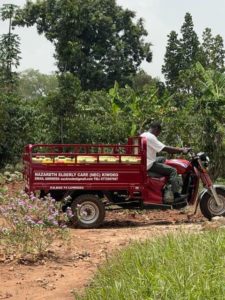It’s hard to believe that the end of today marks the halfway point for my time in Kiwoko. I feel like I’ve only just arrived. Today was another day off, and I started it at church. After the service, there was a breaking ground ceremony of 8 acres of land that will be used to build a senior living type facility. There was a blessing of a well pump that was built on the property as well as a converted motorcycle (see below) that will serve to carry supplies and people throughout the community. After the ceremony, we went to several homes of elderly people in the community in order to deliver fresh water and food to them. I had previously thought that there weren’t many elderly people. I realized though that in a society that relies on getting water from a pump that is sometimes a mile away and buying food to be used the same day, people with limited mobility will have neighbors and family bring these items to you. For this reason, I would not expect to see these individuals typically on the busy streets of the town. This exemplifies an interesting point that has been brought up both in my formal learning for global health and by some of the practitioners here: as medicine is improving in developing nations, people are living longer. As people live longer, chronic diseases become more prevalent. Many developing nations have been so focused on treating infectious diseases that medical professionals are not as well trained in the management of chronic diseases such as diabetes, hypertension, kidney disease, etc. Also, there is not a lot of education about prevention of development of these disease processes which makes sense as 20 to 30 years ago people would be expected to pass away from an infectious illness before developing any of these diseases of old age. Over the next 2 to 3 decades, it is reasonable to assume this will be a large are of growth for medicine in these countries. This is personally exciting to me as it may be an area where my Western knowledge could be helpful.
Lugandan word of the day: amaka (noun, family)
Medical learning point of the day: (I don’t really have one for today but will contribute a suggestion.) Perhaps consider asking adults as part of the social history who they are responsible caring for. This may help better characterize a patient’s social situation while also identifying vulnerable populations in the community that do not present for regular medical care (people with disabilities, elderly, children, etc).


